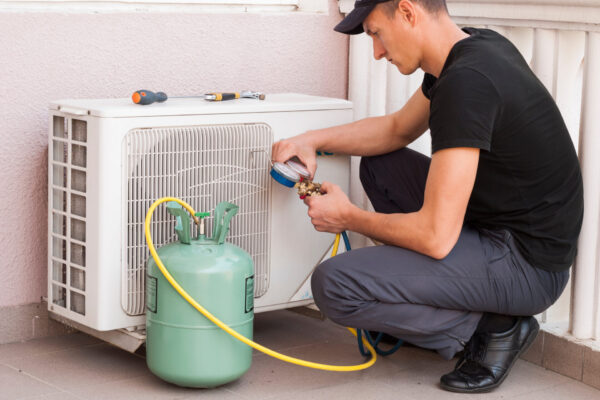
Ask people who live in Middle Georgia what the unavoidable necessities of life are, and you may get a few different lists. Some people can’t make the day without their coffee. Some wouldn’t be able to survive if deprived of their favorite TV show or their lovingly restored 1978 Chevy pickup. But four things will appear on almost everyone’s list:
- Food
- Water
- Shelter
- Air conditioning
Of those four, the last one is particularly non-negotiable when the temps break 100 degrees and the humidity hits its most miserable highs. And it wouldn’t be possible without one very specific product: refrigerant.
Refrigerant, or as it’s commonly and often incorrectly called, Freon, is the lifeblood of your home and auto air conditioners, your refrigerator, and just about any other electrical appliance that cools things. You may have also heard it referred to as “gas,” “Puron,” “service,” “charge,” or any one of a handful of complex chemical names that apply to each variety.
In this article, we’ll look at what refrigerant is and how it works, and then we’ll explore some of the different types of refrigerant that are commonly used in the HVAC industry today.
A Note on Names
“Freon” is one of those names like Band-Aid or Coke – it’s actually a specific, trademarked name, but it is commonly used to describe any of that type of product. People refer to any adhesive bandage as a Band-Aid, and here in Georgia, any carbonated beverage is a Coke.
While you will frequently hear people refer to refrigerant as Freon, understand that the word “Freon” is a trademark for a particular type of refrigerant, one that’s no longer used in new air conditioning systems. (We’ll get deeper into that later.)
What Is Refrigerant and How Does It Work?
Your air conditioner operates on the principle of evaporative cooling. When a liquid evaporates, it absorbs a considerable amount of heat as it changes from a liquid to a gas. It will pull that heat from whatever it’s in contact with – your skin, the surrounding air, or anything else.
If you’ve ever used a propane grill on a hot day, you’ve experienced this phenomenon: when you open the valve on the propane cylinder, the liquid propane inside will begin to evaporate simply because the pressure inside the cylinder drops. But as the propane becomes a gas, it absorbs heat from its surroundings. On a hot, humid enough day, you’ll see a layer of frost form on the upper half of the propane tank as the expanding gas pulls heat from the metal cylinder.
In an air conditioning system, precisely the same thing is happening, but in a closed system (in fact, some air conditioners use propane as their refrigerant). Instead of leaving the system to be burned or just vented to the atmosphere, the refrigerant in an air conditioner is reused over and over again, evaporating, condensing, and being re-compressed back into a liquid constantly whenever the system is running.
Why Are There Different Types of Refrigerant?
Refrigerants are tricky compounds. They have to exist as a gas at room temp, easily compress to a liquid state, absorb considerable heat when they evaporate, and liberate that heat just as readily when they condense.
Unfortunately, many of the chemicals that exhibit those traits also have dangerous qualities for people and the planet. Since the first refrigerant-based cooling systems were invented, engineers and chemists have been working to reduce the potential hazards of refrigerants and make them safer for the environment.
As time has passed, the HVAC industry has moved from using ammonia-based refrigerants to using chlorofluorocarbon gases to moving beyond chlorofluorocarbons to safer alternatives.
The other reason for different types of refrigerants is that various products perform differently. What works to power a 4-ton commercial air conditioner may not work as well for a small dorm fridge.
What Are the Different Types of Refrigerant?
There are dozens of different refrigerants on the market today, but there are a few that are by far the most used products:
Freon (R-22)
This gas was the standard for home air conditioning for more than 20 years. It also, however, was a significant factor in the deterioration of the ozone layer. American manufacturers stopped producing units using R-22 in 2010, and the production of new R-22 has been halted since 2020.
If you have an air conditioner that was manufactured prior to 2010, it may use R-22. In that case, getting your air conditioner serviced is going to be more expensive since HVAC techs can now only use reclaimed R-22 in your system.
Puron (R-410A)
In response to environmental concerns around refrigerants, most manufacturers switched to the less harmful R-410A, commonly called Puron. R-410A has less ozone-damaging potential but still produces some negative environmental impact when released into the atmosphere. If your home’s air conditioner was manufactured after 2010, it probably uses R-410A.
Isobutane (R-600 series)
This refrigerant is more common in refrigerators than air conditioners. If you’ve recently purchased a new refrigerator, you may have seen the word “Isobutane” stamped into the back of the appliance. This refrigerant has no impact on the ozone layer and contributes very little towards global warming. Unfortunately, isobutane is flammable, so leaks must be handled very carefully.
Automotive Refrigerants
The air conditioner in your car uses refrigerant, too. Most automotive air conditioners don’t use the same refrigerants as residential or commercial air conditioners. Common automotive refrigerants include R-12 (banned in the 1990s), R-134A (common in most cars on the road today), and the new R-1234YF (gradually replacing R-134A).
Emerging Refrigerants
The search continues! As we build towards a more sustainable future and the technology of air conditioners improves, the next refrigerant that will keep our homes and businesses cool is on its way – and you can trust that we’ll be keeping an eye on things to help our customers make the best choices when looking for a new air conditioner!
Pruett Air Conditioning Knows Freon, Puron, and All the Other “-ons.” If Your AC Isn’t Keeping Up With the Heat, Don’t Wait Until It’s Too Late – Call the Man Today!
Trust us: you’re going to want to know that your AC is working at the top of its game here in just a few weeks! If you have a refrigerant leak or are just low on service, you need to get that fixed as soon as possible. Give us a call at 478-953-4986 .
Pruett Air Conditioning has offices in Warner Robins and Eastman, GA, so no matter where in Middle Georgia you’re located, Pruett is your local HVAC company.
- Bonaire, GA
- Byron, GA
- Centerville, GA
- Cochran, GA
- Dublin, GA
- Eastman, GA
- Fort Valley, GA
- Kathleen, GA
- Macon, GA
- McRae, GA
- Perry, GA
- Warner Robins, GA

